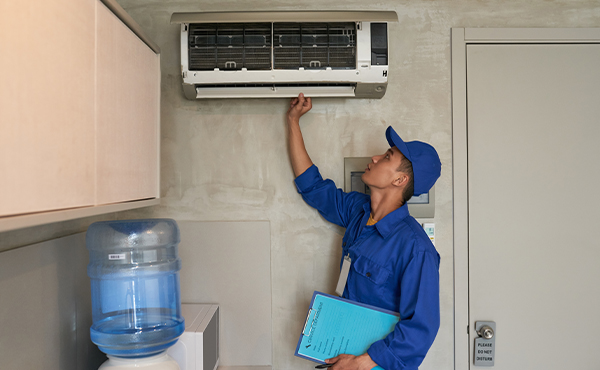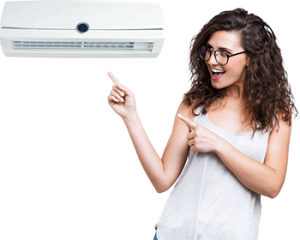Common Problems With Air Conditioners and Ways to Prevent Them
Air conditioners are an integral part of every home and the need to carry out regular service is imperative. This is because if an AC is not serviced regularly, will dip in its performance and will give reduced output. Furthermore, it will also lead to a waste of electricity.
There are a few alarming issues that can crop up with air conditioners over some time; they are:

Low Refrigerant: Your air conditioner uses the refrigerant to extract heat and moisture from the indoor air of your house or workplace. If there are leaks in the lines, you may run out of refrigerant and cooling efficiency will reduce drastically. Unfortunately, repairing this air conditioner issue requires more than simply replacing the refrigerant. A repair technician must locate the leaks and repair the holes, which can be a time-consuming and costly process, particularly if there are multiple leaks.
Frozen Evaporator Coils: The evaporator coil in your air conditioner is filled with refrigerant and it absorbs heat from the air like a sponge. Despite seeming counterintuitive, the coils need warm air to circulate around them in order to operate effectively. When airflow malfunctions and the evaporator coil becomes too cold, a layer of ice can be formed on the outside. When this happens, your air conditioning supply registers will either produce warm air or produce no air at all.
Dirty Condenser Coils: Your air conditioning unit’s outdoor part has condenser coils that remove heat from the air. These coils also expel the heat outside the building. When the condenser coil is covered in dirt and grime, it will not function normally. With all of the soot and pollution in the air, this is a very common problem in Melbourne. Heat transfer is hampered as a result and your AC has to work harder to do its job. This eventually increases wear on the parts and can lead to system failure.
Issue With Fans: There is a fan that blows air over the evaporator coil of your unit to cool it. Another fan blows air over the condenser of the outdoor unit to expel the absorbed heat outside the building. On occasion, one of those fans may cease to operate normally because of a defective motor, insufficient lubrication, worn-out belts, or an excess of dirt and debris. This will end up you have issues such as poor airflow. Neglecting it may result in compressor failure, a common cause of irreparable damage to your air conditioner, ultimately leading to the end of its lifespan.
Leaking Ducts: The ductwork that runs through your walls and ceilings transports the cooled air from your air conditioner throughout the space. However, if there are holes or breaks in the ducts, that expensive cooled air will end up inside your walls, where it will be wasted. Undoubtedly, this situation causes your air conditioner to exert more effort, resulting in higher energy expenses.
Issues With Thermostat: If you still have an outdated dial-type thermostat, it may be poorly calibrated, which means your air conditioner isn’t getting the proper commands from the control system. This issue is easily resolved by replacing or recalibrating your thermostats. On the other hand, if you have new programmable thermostats, they can be difficult to program and may be set incorrectly. Check the instructions in the manual if you still have it to ensure that your thermostat’s settings are correct.
Clogged Drains: All of the moisture removed from the air by your air-con has to go somewhere. It’s supposed to be removed from the area via a drain line, a pan, and finally a drain. The issue is, water can back up and damage your system if the line or drain becomes clogged or the pan becomes full. Water leaks can in the long run cause damage to your walls, ceilings, and furnishing. Mould will eventually grow if you don’t notice it right away.
Easy Steps to Prevent Problems With Your Air Conditioner
Here are a few steps that you can perform in order to keep your AC running smoothly without any issue:
Change Dirty Air Filters: Airflow issues that cause coils to freeze are frequently caused by clogged air filters so it is better to change them.
Inspect the Ducts and Fix Holes: If it appears that there isn’t enough air coming from the registers or if your energy bills continue to rise, have a professional inspect your ducts.
Install and Learn to Use the Thermostat: Install new thermostats that are more precise and save energy to replace old control systems. Thermostats that can be controlled remotely via your Smartphone or tablet are also available.
Remove Brush and Debris From the Outdoor Unit: If debris and dirt accumulate in the condenser and outdoor fan unit, it can hinder the unit’s capacity to release heat effectively. So, you need to get it cleaned to make it work efficiently.
Do Not Skip Regular Maintenance: With regular maintenance, almost all of the above-mentioned most common causes can be easily avoided. Allow a professional to check and tune up your system each spring before you turn the AC ON for the first time.
When to Replace Heating or Air Conditioning and How Much Will Its Average Cost?
There may come a time when you must decide whether to repair or replace an AC unit. Typically, the cost of a repair is much lower than that of purchasing and installing a new unit. That appears to be a solid foundation for making a decision. So, if you want to know more about the average cost to replace the heating and air conditioning, keep reading.
Investing in repairs can be considered a wise investment if you are certain that it will restore your system to its maximum efficiency and prevent the need for any future repairs. However, if the compressor fails a few months later and then the pump motor fails, the maintenance costs will give you a headache. As a result, it is worthwhile to consider a variety of factors to help you determine what the best choice is for you.
Here, we’ve compiled a list of suggestions to make things easier for you.
Size of the Unit
When it comes to changing your air conditioner, it can be irritating to think about the cost. However, you can save money by making sure your unit is the correct size. Purchasing a device that is too large can result in you paying for power and capabilities that you will seldom if ever, use.
Use of Energy
Many HVAC items have been redesigned as a result of the green movement. By opting for a low-energy choice, you can reduce your carbon footprint. It can also assist you in getting superb cooling while minimising your monthly bill.
Manufacturer’s Warranty
Replacing your air conditioner is a major undertaking. Anyone making this investment wants to know that their new item will last for years. A warranty protects you against any issues and may even provide you with advice on how to keep your air conditioner in good working order.
Maintenance and Servicing
Every air conditioning unit is unique but they all, however, have one thing in common: the requirement for upkeep. Regular maintenance extends the life of a new air conditioner and allows buyers to reap the long-term benefits of their investment.
Installation Cost
While a person’s attention may be drawn to the cost of a new air conditioner, it is all too easy to miss the installation costs. It’s a good idea to check with AC installation providers to see how much they charge before deciding on a unit. The average cost of replacing an air conditioner ranges depending on the type of equipment used and other factors.
What is the typical cost of installing air conditioning in a home?
The final cost of installing an air conditioning system depends on a variety of factors, including
The unit’s size and type that is being installed.
The amount of ducting, piping, cabling, and other items required
The location of installation, such as access
They also consider which part of the house it will be installed in and how the units are to be drained. Also, the electrical infrastructure of the home, which may require an upgrade to the main power board and the installation of safety switches in some cases. So, before making any decisions, it is a good idea to get a few installation quotes from the company you are working with.
So, if you are looking for the right people to handle your HVAC system and carry out periodical services in a professional manner, contact the experts at Wollongong Aircon Guy.You can email at info@jrsair.com.au or to request a quote, you can fill out the form available on the official website.
FAQs
Here are a few common questions that people want to find answers to:
Setting the indoor humidity range between 35% and 50% produces the best results without causing condensation in the windows. This is significant because condensation can promote mould growth, which can lead to respiratory problems.
Maintaining your HVAC system regularly ensures that it operates efficiently. As a result, less energy is required to keep the unit running properly. An unmaintained HVAC system consumes more energy due to malfunctioning components.
At least once a month, air filters should be checked. You should check to see if your air filter is disposable and if so, dispose of it once it becomes dirty. The lifespan of air filters varies based on their type and brand, with certain filters lasting up to a few months. In this case, it is best to consult the information document or manual.
We believe it is true because it can save you up to 20% on cooling costs when it comes to your HVAC system. When you think about it, that’s a lot of money saved in the long run. It also allows you to have more precise control over your HVAC system.










